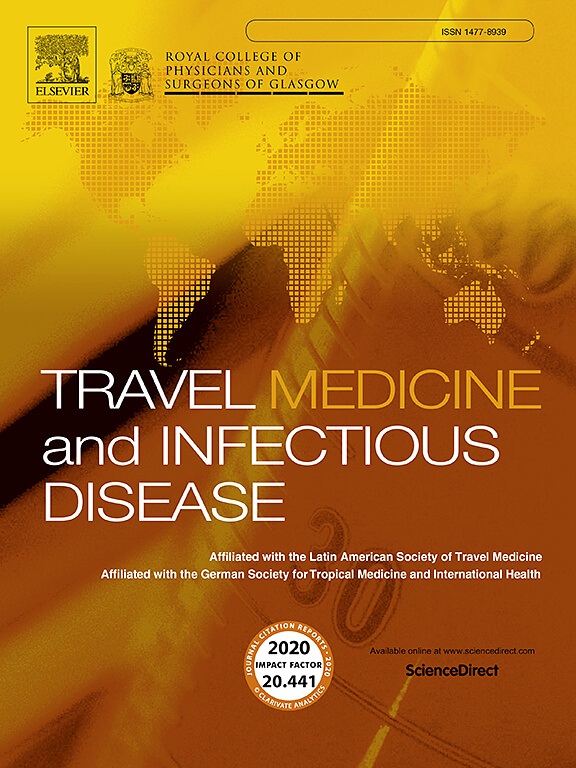台湾糖尿病患者之旅行型态、旅行前准备与旅行相关发病率。
IF 4.7
3区 医学
Q1 INFECTIOUS DISEASES
引用次数: 0
摘要
背景:国际旅行给糖尿病患者带来了独特的健康风险。本研究探讨了他们的旅行模式、准备工作和发病率,并确定了影响旅行前向初级医疗保健提供者寻求健康服务行为的因素:这项基于问卷的横断面研究招募了在过去 12 个月内进行过国际旅行的成年糖尿病患者。通过问卷调查和电子病历收集了有关社会人口学和临床特征、旅行模式、准备工作和旅行相关发病率的数据。我们进行了多变量逻辑回归分析,以确定患者向医生告知旅行计划的预测因素:在 250 名参与者(中位年龄:65 岁 [57-69];中位 HbA1c:7.1 % [6.6-7.9])中,16.4% 正在接受胰岛素治疗。旅行时间的中位数为 6 天(5-10 天),跨越时区的中位数为一个时区。与未接受过胰岛素治疗的人相比,接受过胰岛素治疗的人计划旅行的时间往往较短,目的地也较近。虽然 70.8% 的参与者携带了治疗急性病的药物,但只有 10.8% 的人将旅行计划告知了他们的主治医生,11.2% 的人经历了与旅行相关的发病,包括急性病、跌倒和低血糖。将旅行计划告知医生的预测因素包括旅行时间超过 10 天(OR:4.87,95% CI:1.34-17.63)、胰岛素治疗(OR:4.37,95% CI:1.21-15.80)、旅行期间采取低血糖预防措施(OR:3.40,95% CI:1.26-9.14)以及良好的抗糖尿病药物依从性(OR:2.96,95% CI:1.10-7.96):本研究强调了糖尿病自我护理方法对旅行前寻求健康行为的影响,并展示了胰岛素治疗如何影响旅行模式,突出了加强自我管理技能和有针对性的旅行前指导的必要性,尤其是对胰岛素治疗患者而言。本文章由计算机程序翻译,如有差异,请以英文原文为准。
Travel patterns, pretravel preparation, and travel-associated morbidity in travelers with diabetes in Taiwan
Background
International travel poses unique health risks for individuals with diabetes. This study explored their travel patterns, preparations, and morbidity, as well as identify factors influencing pre-travel health-seeking behavior from primary healthcare providers.
Methods
This cross-sectional, questionnaire-based study recruited adults with diabetes who had traveled internationally within the past 12 months. Data on sociodemographic and clinical characteristics, travel patterns, preparations, and travel-associated morbidity were collected via questionnaires and electronic medical records. Multivariate logistic regression analyses were conducted to identify predictors of patients informing physicians about travel plans.
Results
Among 250 participants (median age: 65 years [57–69]; median HbA1c: 7.1 % [6.6–7.9]), 16.4 % were on insulin therapy. The median travel duration was 6 days (5–10), with a median of one time zone crossed. Insulin-treated individuals tended to plan shorter trips to closer destinations than their non-insulin-treated counterparts. While 70.8 % of participants carried medicines for acute illness, only 10.8 % informed their primary care physicians about travel plans, and 11.2 % experienced travel-associated morbidity, including acute illness, falls, and hypoglycemia. Predictors of informing physicians about travel plans included travel duration exceeding ten days (OR: 4.87, 95 % CI: 1.34–17.63), insulin therapy (OR: 4.37, 95 % CI: 1.21–15.80), taking preventive measures against hypoglycemia during travel (OR: 3.40, 95 % CI: 1.26–9.14), and good antidiabetic medication adherence (OR: 2.96, 95 % CI: 1.10–7.96).
Conclusions
This study underscored the impact of diabetes self-care practices on pre-travel health-seeking behavior and demonstrated how insulin therapy shapes travel patterns, highlighting the need for reinforced self-management skills and targeted pre-travel guidance, especially for insulin-treated patients.
求助全文
通过发布文献求助,成功后即可免费获取论文全文。
去求助
来源期刊

Travel Medicine and Infectious Disease
PUBLIC, ENVIRONMENTAL & OCCUPATIONAL HEALTH-INFECTIOUS DISEASES
CiteScore
19.40
自引率
1.70%
发文量
211
审稿时长
49 days
期刊介绍:
Travel Medicine and Infectious Disease
Publication Scope:
Publishes original papers, reviews, and consensus papers
Primary theme: infectious disease in the context of travel medicine
Focus Areas:
Epidemiology and surveillance of travel-related illness
Prevention and treatment of travel-associated infections
Malaria prevention and treatment
Travellers' diarrhoea
Infections associated with mass gatherings
Migration-related infections
Vaccines and vaccine-preventable disease
Global policy/regulations for disease prevention and control
Practical clinical issues for travel and tropical medicine practitioners
Coverage:
Addresses areas of controversy and debate in travel medicine
Aims to inform guidelines and policy pertinent to travel medicine and the prevention of infectious disease
Publication Features:
Offers a fast peer-review process
Provides early online publication of accepted manuscripts
Aims to publish cutting-edge papers
 求助内容:
求助内容: 应助结果提醒方式:
应助结果提醒方式:


